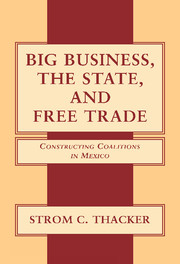Book contents
- Frontmatter
- Contents
- List of Figures
- List of Tables
- List of Abbreviations
- Acknowledgments
- 1 Introduction: International Context, Domestic Interests, and Mexican Trade Reform
- 2 Coalition Politics and Free Trade
- 3 Structural Power Relations Between Business and the Mexican State
- 4 Trade Policy Coalitions in the 1980s
- 5 Assembling Teams and Building Bridges
- 6 Business Participation in the NAFTA Negotiations
- 7 Conclusion: Mexico in Comparative Perspective
- Appendix
- References
- Index
1 - Introduction: International Context, Domestic Interests, and Mexican Trade Reform
Published online by Cambridge University Press: 12 January 2010
- Frontmatter
- Contents
- List of Figures
- List of Tables
- List of Abbreviations
- Acknowledgments
- 1 Introduction: International Context, Domestic Interests, and Mexican Trade Reform
- 2 Coalition Politics and Free Trade
- 3 Structural Power Relations Between Business and the Mexican State
- 4 Trade Policy Coalitions in the 1980s
- 5 Assembling Teams and Building Bridges
- 6 Business Participation in the NAFTA Negotiations
- 7 Conclusion: Mexico in Comparative Perspective
- Appendix
- References
- Index
Summary
THE PROBLEM
The inauguration of the North American Free Trade Agreement (NAFTA) on January 1, 1994, ushered in a new era in trade relations for Mexico, the United States, and Canada. This date also marked an end of sorts, the culmination of a dramatic turnaround in Mexican trade policy that transformed the Mexican economy from one of the most closed to one of the most open in the developing world. This process began in 1983, accelerated between 1985 and 1988, and has been consolidated since 1990 with the emergence, negotiation, approval, and implementation of NAFTA. Over a span of scarcely a decade, the governments of Miguel de la Madrid and Carlos Salinas de Gortari reversed four decades of trade policy predicated on an import-substituting industrialization (ISI) model of development intended to promote the industrialization of the Mexican economy through the restriction of most imports by a variety of high trade barriers, including tariffs, quantitative restrictions, import licenses, and official pricing mechanisms.
Trade is not the only aspect of the Mexican economy that has undergone important changes since the early 1980s. Recent governments have freed domestic prices, relaxed exchange controls, stabilized inflation, opened the foreign investment regime and domestic capital markets, privatized nearly 90 percent of the country's state-owned enterprises, cut government spending, and reformed the tax system (see Edwards 1995). But what is perhaps most surprising about the post-1982 period is that trade protection, which historically had been one of the most consistent elements of Mexican development policy, was effectively dismantled in almost all sectors of the economy.
- Type
- Chapter
- Information
- Big Business, The State, and Free TradeConstructing Coalitions in Mexico, pp. 1 - 11Publisher: Cambridge University PressPrint publication year: 2000



